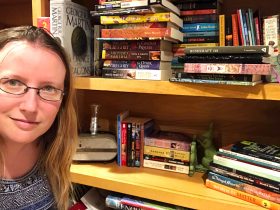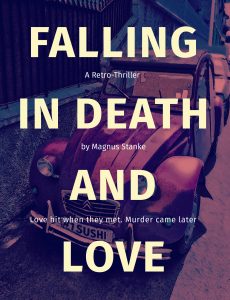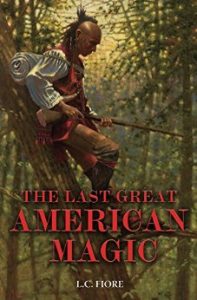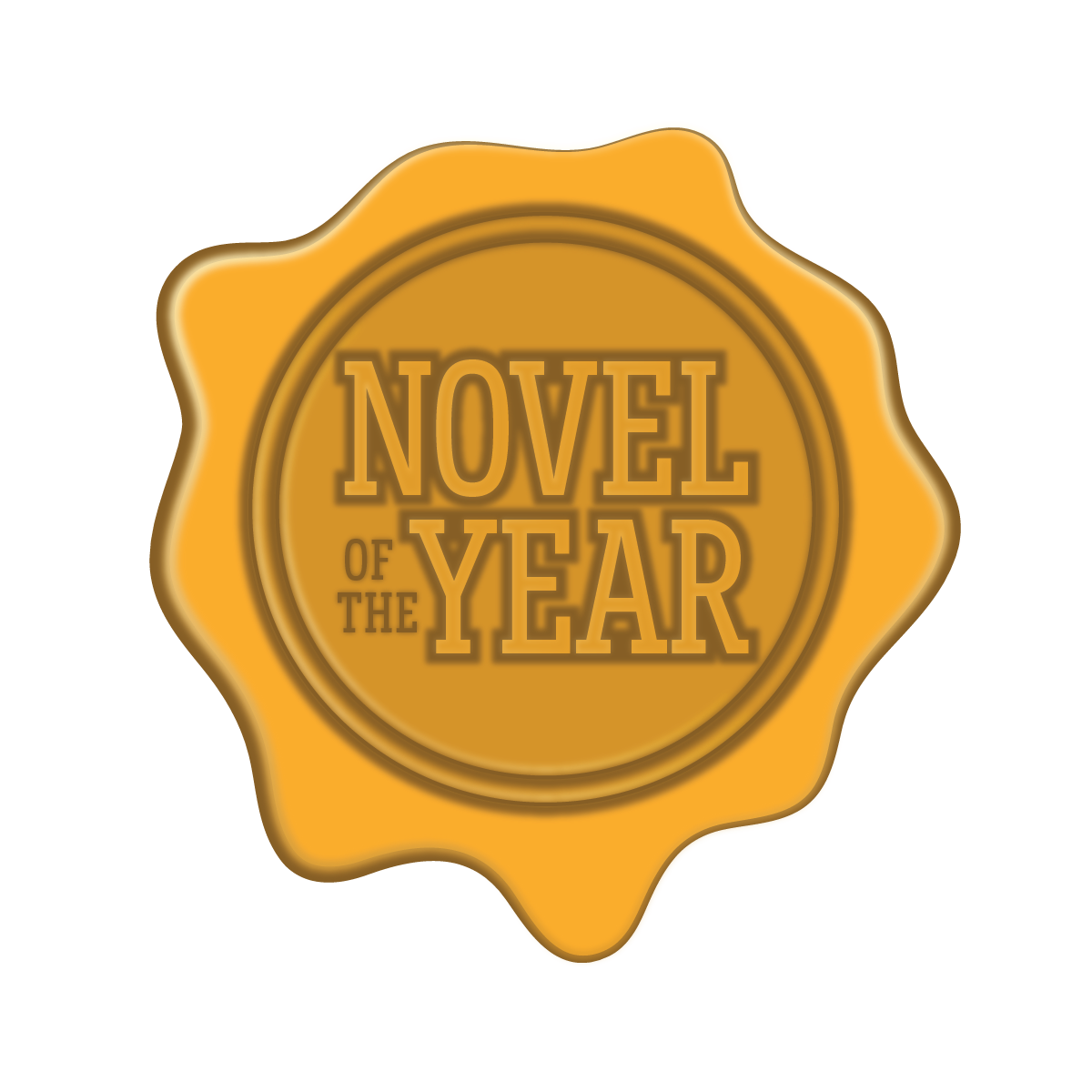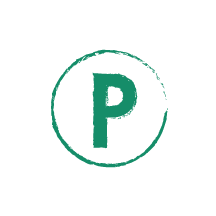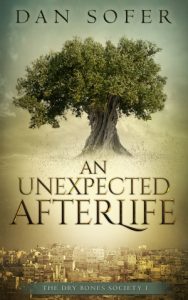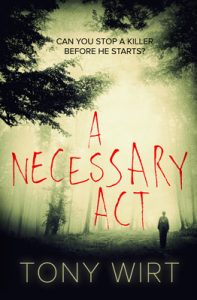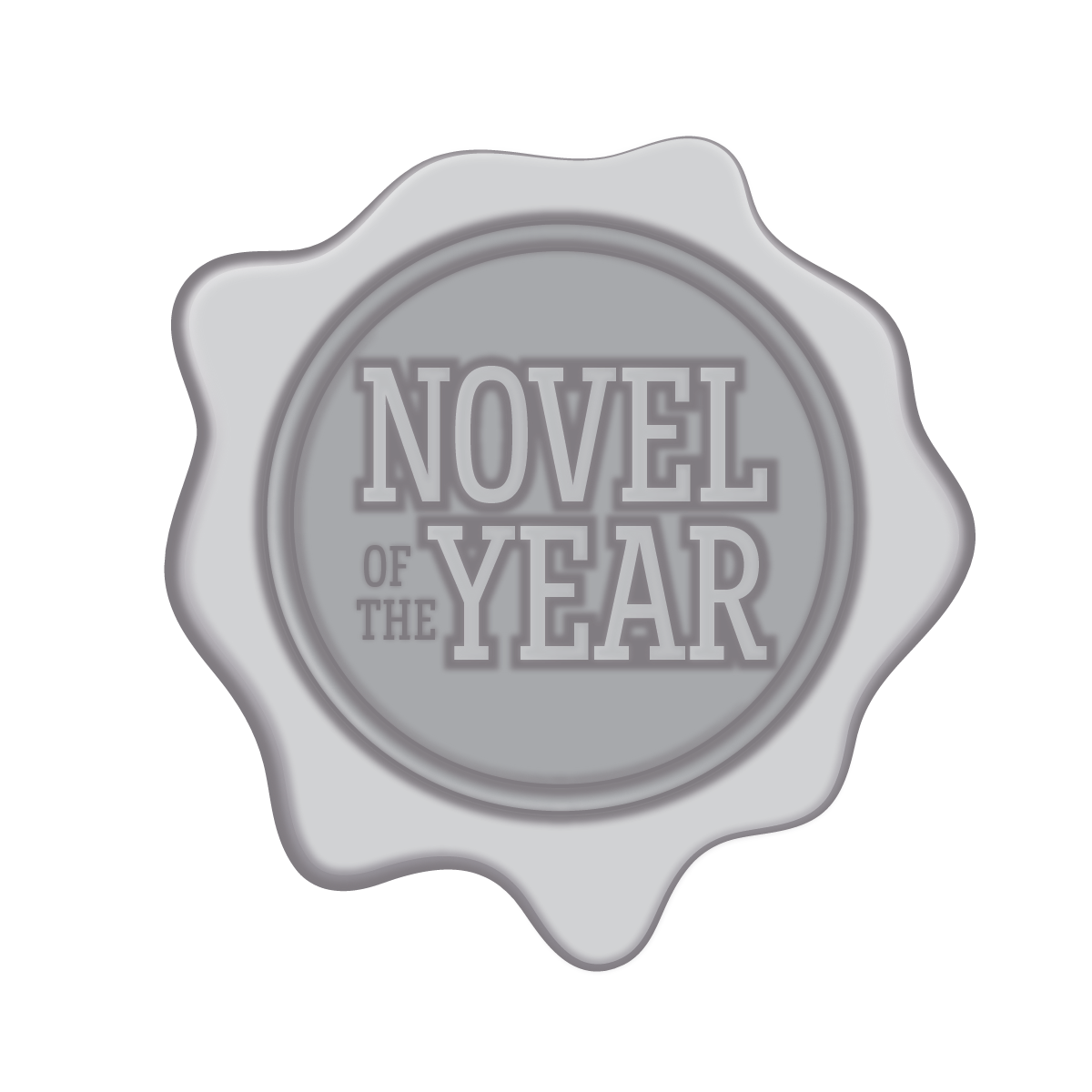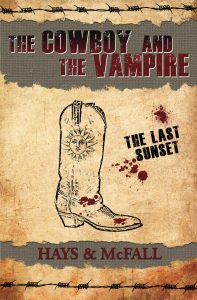The Rundown
The Recommendation
The Rating
The Links
The Reviewer
Bill Kieffer
Visit Bill Kieffer‘s website.I'm a sucker for titles with puns and I like strong women characters, so when I first tripped across the Open Call for BROAD KNOWLEDGE, I was intrigued. I had many story ideas, but I identify as male (although just barely), and this call was for female writers. Still, the more I read about the company behind BROAD KNOWLEDGE, the more interested I became. Wonderful covers and the titles betrayed wit and whimsy, so I decided that I should use my interview column as a way to "meet" Joanne Merriam, the driving force behind Upper Rubber Boot.
Joanne Merriam on Her Book Shelf
This is just a small segment of a room full of books - my house has an extra bedroom that we converted into a library with built-in shelving after a water leak caused us to have to replace the interior walls anyway. It's a small room, but we've packed in a lot of books!
The rabbit bookend is part of a kind of theme of the room - there's a matching bookend on another shelf, and a set of minimalist pottery rabbits on a third shelf. We have had pet rabbits since 2004. Three years ago we had five rabbits, including a foster we held onto for a year before finding a forever home for him. Three have passed away of old age in the past two years. We're down to one, an elderly black and white English Spot rabbit named Scrambles the Death Destroyer. We'll probably pause for a few months to a year after she passes, and then get two or three new bunnies from the local rescue society, which my husband volunteers for.
The small pile of books in the lower right of this picture are the ones I picked up at the most recent AWP conference Bookfair, which is a dizzying affair with over 700 small presses all selling the most amazing books. Every year, I have a lot of trouble limiting myself to only getting a few new books. Of those, the book I'm most excited to read is Ursula K. Le Guin's Words Are My Matter (Small Beer), though Derrick Weston Brown's Wisdom Teeth (PM Press) is a close second. I have a number of novels on my Kindle that I want to read first, including the sequels to Liu Cixin's Three-Body Problem, Ken Liu's The Grace of Kings, and N.K. Jemisin's Inheritance trilogy, all of which have been sitting around purchased but unread for far too long.
The overstuffed shelf on the top is my to-read and currently-reading pile (it actually extends to a second shelf behind my head), which that AWP pile properly belongs to. Right now, I'm reading Bushcraft 101 (I've just learned to set a fire with only scavenged materials and flint and steel).
About Upper Rubber Boot
Please describe Upper Rubber Boot Books briefly and what genre(s) you serve.
URB is a micro press (we only publish 2-4 titles/year). We have two series: the Floodgate Poetry Series, which is published annually and contains three poetry chapbooks per volume, and the Women Up To No Good series, which is published more irregularly and features dark fiction by and about women. We also publish anthologies, novellas, and single-author poetry and short story collections.
How did you come to found URB?
We started out as an ebook publisher of poetry, primarily because I was annoyed by how badly major presses were formatting poetry ebooks at the time. We published our first titles in 2011. I quickly discovered that people don’t really buy poetry in ebook format (or at all!), and branched out into both fiction and print books in 2012.
Do you have a staff? Can you introduce us?
I edit a little fewer than half of our titles.
Andrew McFadyen-Ketchum is the series editor of the Floodgate Poetry Series, and also acts as our acquisitions editor for poetry books and books about poetry.
A number of our anthologies have outside editors, who only work with us on that project, like Phoebe Wagner and Brontë Christopher Wieland, who are editing our upcoming release SUNVAULT: STORIES OF SOLARPUNK AND ECO-SPECULATION, or like Octavia Cade, who will be editing SHARP & SUGAR TOOTH, the third in the Women Up To No Good series, slated for 2018.
What was the first time you really felt like you were a publisher?
Definitely when I published Margaret Atwood! Andrew convinced her to let us use one of her stories in APOCALYPSE NOW: POEMS AND PROSE FROM THE END OF DAYS.
Tales of Yourself
What did you read before you even thought of publishing? How did becoming a publisher change your reading habits?
Poetry, science fiction, fantasy, romance, mysteries, science non-fiction, in about that order. Becoming a publisher has severely limited the time I have available for reading for pleasure, and I’m more critical of what I read, too - it’s hard to turn that off! I know I really love a book when I realize that I’ve been reading it without thinking about how I’d edit it.
What do your friends and family think of your publishing endeavors? Are they supportive? Have they tried to hold an intervention? Or do you find yourself reminding them of your true calling?
I’m fortunate to have a very supportive family, who have taken on a greater share of housework in order to free up more of my time for publishing, since I also have a day job and must use what used to be my free time for this. I try to keep a balance, though - it can become all-consuming and I don’t want to burn out.
If you meet someone for the first time and they introduce themselves as a writer, do you... a) say “Hey, funny coincidence...” b) talk about your “day job” exclusively... or c) point to a grouse in the trees and run away when their back is turned?
Definitely a.
I love talking about writing and publishing, and I’ve found some ways to diplomatically direct people towards other sources if their writing isn’t my cup of tea. But we can all learn from each other. It’s such a solitary endeavor, we need to have a community.
On Community Interaction: Readers/Fans
How do you find your readers? Or do readers tend to find you?
I’m very aggressive about social media promotion, so I think most readers find us that way. A number of people also find us through conferences and conventions (we typically go to two or three a year). It’s a bit of a mystery, though, because, like most small presses, we don’t have the resources to really track how people find us.
How do you interact with your readership? Do you have a forum? A newsletter? Pen-pals?
None of that - we’re on Facebook and Twitter, and to a lesser extent Tumblr and Instagram. I talk to other writers and publishers a lot online.
What conventions or conferences do you attend where you meet fans? Do you tend to appear on panels, or do you prefer to revert to a fan yourself?
We have a table in the Bookfair of AWP (Association of Writers & Writing Programs) whenever it’s within about a 12-hour drive of Nashville, where I live. We were there this year in Washington, DC, and we’ll be there next year in Tampa, FL. I am on panels at MidSouthCon, a sci-fi convention in Memphis, and Hypericon in Nashville, most years. I hope to add a few new sci-fi cons in 2018 or 2019, but haven’t decided which ones yet.
On Community Interaction: Writers
Without naming names, tell me what your worst author interaction was. Was bail money involved?
Probably the three dudes who have called me a cunt for rejecting their work. I’m more baffled by these interactions than upset, because I don’t understand their end game. The vast majority of authors are charming and funny and lovely people, though. As a group, I find writers to be more thoughtful and curious than the general public.
In addition to being a publisher, do you offer any literary services for creators outside of your publishing company?
No. I used to do manuscript evaluations, but I only do that now for the occasional charity or Kickstarter reward. (Keep an eye out for an upcoming Kickstarter for the next Women Up to No Good book: BROAD KNOWLEDGE-Bill)
How much say do your creators have in selecting a cover artist? How much say in the layout and design?
I’m happy to take suggestions, and have used cover art suggested by several of my editors for their anthologies. Most recently, the Sunvault editors suggested we commission art from Likhain, who produced a really gorgeous piece for our cover, and who is a finalist this year for a Hugo for Best Fan Artist. I don’t typically give any say in cover design/layout, though.
On Marketing
Most indie authors understand that they must do some marketing of their book, once it’s published. If publishing was a pool and marketing was swimming, are you the doting parent that shows them a video, buys them water-wings, and eases them in? Or are you more the uncle that throws them into the deep end with a slap on the ass and a hearty “Sink or Swim!” shout?
I do a lot of the marketing, and also send writers suggestions for ways to promote. I do expect my authors to do some of their own promotion.
Community Interaction: Local Real World Stuff
What is your area like? What attracted you to it? Do you find it inspiring in any way?
I moved to Nashville because I married an American (I’m Canadian) who had gone to university here. He lived in Murfreesboro, a half hour drive from Nashville, the whole time we dated, and I fell in love with the area. Tennessee has really amazing state parks - lots of waterfalls and deer. I’m just back from a six-mile hike at Long Hunter State Park, which is on Percy Priest Lake, a 20-minute drive from my house.
Do you work with any local writers or know any?
The Floodgate series editor, Andrew McFadyen-Ketchum, is originally from Nashville, though he lives in Colorado now,. He comes back pretty often to visit his family, so we’re able to chat in person about our plans. A number of really fantastic poets live here, including Chet Weise, who was in Apocalypse Now: Poems and Prose from the End of Days and who is one of the masterminds behind Third Man Books, and Peg Duthie, whose Measured Extravagance we published in 2011, and who is also in How to Live on Other Planets: A Handbook for Aspiring Aliens.
Have you done any readings at local schools, hospitals, or senior center? How did they go over?
Chet Weise, Tessa Mellas, and Maggie Smith (whose poem “Good Bones” was just featured on the tv show Madam Secretary in the episode of the same name) read from their poems in Apocalypse Now: Poems and Prose from the End of Days at the main branch of the local public library and at East Side Story, a wonderful bookstore in East Nashville that exclusively sells books connected to Tennessee. Brothers Anders and Kai Carlson-Wee and Cave Canem fellows F. Douglas Brown and Geffrey Davis read from their Floodgate Poetry Series Vol. 3 poetry at the Southern Festival of Books and at East Side Story. We’ve also done readings connected to the AWP literary conference in Boston, Los Angeles, and Washington, D.C.
On Business vs Passion, Publisher vs Creator
What business choices have you had to make that really annoyed your creative self? How often do the artist and the publisher within you butt heads? Which side wins the most often? What was your last bad business but good art decision?
I’m tremendously fortunate, in a way, to be working in a niche that doesn’t make much money. I have to break even, but I have a day job, which allows me to take risks with URB that I couldn’t take if this was what paid the bills. Almost all of our poetry books lose me money, and writing in translation is a hard sell to American readers, like the poly-Martian-revolution sci-fi novella Memory, written by Argentine author Teresa P. Mira de Echeverría and translated into English by Lawrence Schimel, which we published in 2015. I think it’s a fantastic book, and it’s been featured on several Book Riot lists, but it’s only sold a small number of copies.
My best business decision so far was one that I didn’t realize would be a good decision when I made it. I was pitched an anthology by H.L. Nelson of dark, horror, and speculative fiction by women, which eventually became Choose Wisely: 35 Women Up To No Good. I thought it would do alright, but would mostly just be a lot of fun to work on. I released it the same month as our immigrant science fiction anthology How to Live on Other Planets: A Handbook for Aspiring Aliens, which got a decent amount of press for a small press title, getting mentions in Strange Horizons, Dark Matters, Gnome Reviews, and Boing Boing. But Choose Wisely, which was mentioned only in Best New Fiction and InDigest, outsold How to Live on Other Planets two to one, and eventually got a nomination for a This Is Horror award. (And it was every bit as much fun as I expected to put together.)
After looking at the Vida Count, which tallies the astonishing gender disparity in major literary publications and book reviews, I decided to turn Choose Wisely into a series, to, in a small way, help address that imbalance. The Women Up To No Good series features fiction with female protagonists, by authors who identify as female, non-binary, or a marginalized sex or gender identity. Broad Knowledge: 35 Women Up To No Good, will be released in late 2017 or early 2018. We’re reading submissions for it through 30 May 2017.
On That Damn Slush Pile
How often is your “open” period, and where do writers find your latest story needs? Do you announce on sites like Horror Tree or Submittable?
We don’t have a standard open period that’s the same from year to year. We post calls for submissions for specific projects with deadlines clearly posted, and when I have space for a single-author title, I open up submissions and mention it on Facebook and usually have to close up again in a week or two.
We promote calls for submissions on our website, Facebook, Twitter, and Tumblr. I also make a point of promoting them to Facebook groups for calls for submissions instead of assuming people will see posts on my own page. Duotrope picks up our calls for submissions, too.
Some good FB groups for writers to join are: Call For Submissions; Calls for Submissions (Poetry, Fiction, Art); Open Call: Science Fiction, Fantasy & Pulp Markets; Open Submission Calls for Horror/Paranormal/Mystery/SciFi Writers; Call For Submissions : QUILTBAG; Asian Science Fiction & Fantasy; Women of Color Writers' Community; WOMPO (Women's Poetry Listserv); and This Literary Community.
Other small presses should also join our Small Press Week Facebook page, which is an initiative I started to promote small press books the week of American Thanksgiving.
Vanity publishers, however, are not welcome, as we feel very strongly that writers should never pay to be published, and we won’t help promote those businesses.
What's your objection to vanity presses?
There are legitimate reasons to pay for your book to be printed: it's such a niche thing no publisher will touch it, for example, like a family genealogy or history of a small town of interest only to those who live there; or it needs to be released by a certain date in the next year or two and you don't have time for the full publishing process; or you're very business-oriented and you essentially want to start your own small press, but with only one client.
In none of those cases are vanity presses providing a better service than would hiring an editor, a proofreader, a cover artist, a printer, and a distributor. It looks simpler, but you pay through the nose, and often end up with very shoddy "editing" or a terrible-looking book.
Vanity presses prey on writers who haven't yet learned about the publishing world. Their advertising frequently relies upon myths about publishing. They lie, in other words, to make money. And at the end of the day, their imprint on a book hurts the writer in a way that self-publishing doesn't, because bookstores and libraries (already an uphill battle to get into for self-published authors) typically will refuse to carry any title produced this way.
If a writer's intention is to sell their work and be widely distributed, then they shouldn't ever pay for the privilege. Money flows to the writer (not a lot of money, granted). The only thing writers should pay for are contest fees if they submit to a contest (and even then, they should receive something in return whether or not they win, like a subscription) and extra copies of their books, beyond the contributor copies agreed to in their contract, which should be provided at a steep discount (usually wholesale or at cost).
I’m sure you have this posted in at least two places on the Internet, but what is an acceptable format for you and how easy-going are you about it?
We ask for standard manuscript format, and we expect writers to know what that is (or know how to google it). I wouldn’t care if I received a genius manuscript that had some weird formatting or used a strange font or whatever, but typically, writers who ignore standards like basic ms. format also ignore other basics, so it turns out to be a fairly good barometer of whether or not I want to work with a writer.
What makes a good cover letter or query letter? What was the last one that really blew your mind and made you want to read the whole book? Do you have any examples of the worst?
I try not to read cover letters until after I’ve read the work. I ask people to put specific wording in the subject lines of their emails, mostly so I can set up a filter to keep them from accidentally going to spam, but which also functions to let me know all I need to know, which is what project they’re submitting to. I open the attachment and read it, or part of it (a good half to three-quarters of what we receive is rejected based on the first page or even the first paragraph), and only then read the email itself. So great cover letters don’t really have any effect.
I’m only speaking for myself, though. Many of the titles I publish are edited by an outside person, who might have a different process.
These days, the slush pile is probably mostly or all piles of pixels. Is there a point where you might print some out to see how the story looks on paper?
I don’t, no. I grew up with digital and it doesn’t bother me.
How do you dole out rejection letters? Do you ever say “maybe with revisions”?
I’ve said “maybe with revisions” maybe three or four times in the past six years, so it’s rare! Most rejections are more or less form letters. I have very rough tiers based on how much I like the work. If I don’t see anything of value in the writing, or if the author is abrasive, I usually send a very bland rejection. If I thought it was good but not my personal cup of tea, or good but too similar to something I’ve already taken for the same project, I’ll generally say so, to encourage the author.
The rejections I work the hardest on are to teenagers. Adults should be able to take a non-malicious rejection, but I never want to crush anybody who might be fragile.
On Current and Future Plans
What was 2016 like for you and URB?
2016 was a smaller year for URB, since we only published two books: Floodgate Poetry Series Vol. 3 and the adventure sci-fi anthology The Museum of All Things Awesome And That Go Boom. We set up a fun website at http://www.matagb.org, which is a museum website for a museum on another planet 500 years in the future.
What are the plans for the immediate future? What books will be rolling off the presses shortly?
Our next title is the hopeful speculative fiction anthology Sunvault: Stories of Solarpunk & Eco-Speculation, edited by Phoebe Wagner and Brontë Christopher Wieland. I’m really excited about it! It’s the first general-audience solarpunk anthology in existence.
We’re also working on the next two Women Up To No Good anthologies, and a poetry how-to book by poet Allison Joseph.
Home page for Upper Rubber Books.

